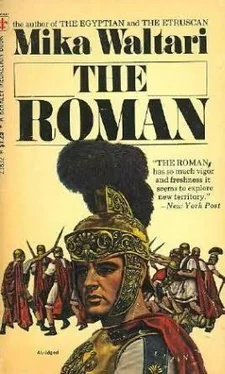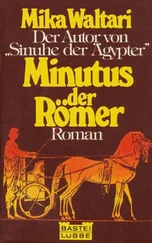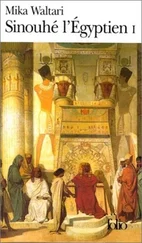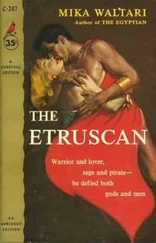Mika Waltari - The Roman
Здесь есть возможность читать онлайн «Mika Waltari - The Roman» весь текст электронной книги совершенно бесплатно (целиком полную версию без сокращений). В некоторых случаях можно слушать аудио, скачать через торрент в формате fb2 и присутствует краткое содержание. Жанр: Исторические приключения, на английском языке. Описание произведения, (предисловие) а так же отзывы посетителей доступны на портале библиотеки ЛибКат.
- Название:The Roman
- Автор:
- Жанр:
- Год:неизвестен
- ISBN:нет данных
- Рейтинг книги:4 / 5. Голосов: 1
-
Избранное:Добавить в избранное
- Отзывы:
-
Ваша оценка:
- 80
- 1
- 2
- 3
- 4
- 5
The Roman: краткое содержание, описание и аннотация
Предлагаем к чтению аннотацию, описание, краткое содержание или предисловие (зависит от того, что написал сам автор книги «The Roman»). Если вы не нашли необходимую информацию о книге — напишите в комментариях, мы постараемся отыскать её.
The Roman — читать онлайн бесплатно полную книгу (весь текст) целиком
Ниже представлен текст книги, разбитый по страницам. Система сохранения места последней прочитанной страницы, позволяет с удобством читать онлайн бесплатно книгу «The Roman», без необходимости каждый раз заново искать на чём Вы остановились. Поставьте закладку, и сможете в любой момент перейти на страницу, на которой закончили чтение.
Интервал:
Закладка:
But Barbus objected pitifully.
“Experience of a lifetime has taught me,” he said, “that a few gulps of wine are enough for my mind and for the whole of my being to take in smells and noises more clearly. Nothing has ever tasted so good in my mouth as the small spiced sausages one can get sizzling hot in Rome. Let us at least stop long enough to taste some.”
My father was forced to laugh. We stopped at the market and went into a small inn which was so old that its floor lay well below street level. Both Barbus and I eagerly sniffed the air.
“Blessed be Hercules!” cried Barbus in delight. “A bit of the old days is left of Rome after all. I remember this place, even if in my memory it was considerably larger and more spacious than it is now. Take a deep breath, Minutus, you who are younger than. I. Perhaps you can smell the smell of fish and mud, of reeds and manure, of sweaty bodies and the incense shops of the circus.”
He rinsed his mouth, spat out an offering on to the floor, and then stuffed his mouth with sausage, chewing and smacking his lips, his head to one side. Finally he said, “Something old and forgotten is in fact returning to my mind. But perhaps my mouth has also grown too old, for I can no longer feel the same sensual bliss as before with sausage in my mouth and a goblet of wine in my hand.”
The tears rose in his old eyes and he sighed.
“I am indeed like a ghost from the past,” he said, “now that the centenary is to be celebrated. I don’t know a single person here, neither a relation nor a protector. A new generation has replaced mine and it knows nothing of the past, so the spiced sausage has lost its flavor and the wine is diluted. I had hoped to come across an old comrade-inarms among the Emperor’s Praetors, or at least in the Fire Brigade of Rome, but now I wonder whether we’d even recognize each other. Woe to the conquered. I am like Priam in the ruins of Troy.”
The innkeeper hurried up, his face shining with grease, and asked what the matter was. He assured us that in his house one could find horsemen from the circus, officials of the State archives, actors, and architects who were putting Rome’s sights in order for the centenary festivities. One could even make acquaintance with nice little she-wolves beneath his roof. But Barbus was inconsolable and replied gloomily that he could not consider a she-wolf, for even that would certainly not feel the same as before.
Afterwards we walked up the hill of Aventine and my father said with a sigh that we should not have turned off into the inn after all, for the garlic sausage had given him a stomachache which not even the wine could allay. He was feeling pressure in his chest and was filled with evil forebodings, which grew worse at the sight of a crow flying past on our left.
In among the new and old apartment blocks, we wandered past several ancient temples which looked sunk into the ground beside the large buildings. On the other side of the hill, my father at last found the Manilianus family property. Compared with our house in Antioch, it was quite a small and neglected building which had at some time had an additional story built on to it to provide more space. But it was surrounded by a wall and a wild garden. When my father saw my contemptuous expression, he said sternly that the plot and the garden alone bore witness to the age and nobility of the house.
The bearers had long since arrived from the Capua gate with our luggage and Aunt Laelia was expecting us. First she let my father pay the bearers and then she came down the steps and along the garden path between the laurel bushes. She was a tall thin woman and had carefully rouged her lined cheeks and darkened her eyes. She was also wanting a ring on her finger and a copper chain around her neck. Her hands trembled as she came to meet us, her cries of joy carefully controlled.
She made a mistake at first, for my father in his humble way had stood in the background to pay the bearers himself, and she stopped in front of Barbus, bowing a little and covering her head as if in prayer.
“Ah, Marcus, what a joyful occasion,” she cried. “You are much changed since your youth. But your stance is now better and your figure more powerful.”
My father burst out laughing.
“Oh, Aunt Laelia,” he cried. “You are as shortsighted as ever. I am Marcus. This good honest old veteran is our companion Barbus, one of my clients.”
Aunt Laelia was annoyed at her own mistake. She went up to my father, peered at him with glittering eyes and fumbled over his shoulders and stomach with shaking hands..
“It is not so strange,” she remarked, “that I no longer recognize you. Your face has swollen, your stomach sags and I can hardly believe my own eyes, for you used to be quite good-looking.”
My father was not offended by her words. On the contrary.
“Thank you for your words, Aunt Laelia,” he said. “A weight has fallen from my mind, for I have had nothing but trouble from my appearance before. As you didn’t recognize me, then hardly anyone else will either. But you haven’t changed a bit. You’re as slim as before and your features are just as noble. The years have not changed you in the slightest. Embrace my son Minutus too, then, and be as good and considerate to him as you were to me in the lighthearted days of my youth.”
Aunt Laelia embraced me with delight, kissed me on the forehead and eyes with her thin mouth and felt my cheeks.
“But Minutus,” she cried, “you already have the beginnings of a beard and are not at all a child to be hugged.”
She went on, holding my head between her hands and looked carefully at my face.
“You look more like a Greek than a Roman,” she said. “But those green eyes and fair hair of yours are certainly very unusual. If you were a girl, I should say you were beautiful, but with those looks you will certainly make a good marriage. Your mother of course was a Greek, if I remember rightly.”
Not until she had stammered and chattered away for some time, as if she herself did not really know what she was saying, did I realize that she was in a state of utter terror. At the entrance we were greeted by a bald, toothless slave, and at his side stood a lame and one-eyed woman. They both knelt in front of my father and called out a greeting which Aunt Laelia had obviously taught them. My father looked embarrassed, patted Aunt Laelia on the shoulder and asked her to go in before us as she was the hostess. The little room was full of smoke which made us all start coughing, for Aunt Laelia had had a fire lighted on the household altar in our honor. Through the smoke I could just make out our family gods in fired clay, and their yellowed wax masks seemed to move in the swirling smoke.
Nervously tripping, coughing and gesticulating, Aunt Laelia began verbosely to explain that according to the traditions of the Manilianus family, we ought really to sacrifice a pig. But as she had been uncertain of the day of our arrival, she had not acquired a pig and could now offer us only olives, cheese and vegetable soup. She herself had long since ceased eating meat. We looked at all the rooms in the house and I saw the cobwebs in the corners, the wretched couches and some other poor furniture, and I suddenly realized that our noble and much respected Aunt Laelia lived in the depths of poverty. All that remained of Manilius the astronomer’s library were a few rat-chewed scrolls, and Aunt Laelia was forced to admit that she had even sold his portrait bust to the public library below Palatine. Finally she broke down and wept bitterly.
“Just blame me, Marcus,” she said. “I’m a bad housekeeper because I have seen better days in my youth. I shouldn’t have been able to keep this household going if you hadn’t sent money from Antioch. I don’t know where the money has gone, but at least it hasn’t gone on luxuries, wine and perfumed ointments. I still hope that my destiny may change any day now. This has been foretold. So you mustn’t be angry with me or ask me for a careful rendering of accounts of the money you sent me.”
Читать дальшеИнтервал:
Закладка:
Похожие книги на «The Roman»
Представляем Вашему вниманию похожие книги на «The Roman» списком для выбора. Мы отобрали схожую по названию и смыслу литературу в надежде предоставить читателям больше вариантов отыскать новые, интересные, ещё непрочитанные произведения.
Обсуждение, отзывы о книге «The Roman» и просто собственные мнения читателей. Оставьте ваши комментарии, напишите, что Вы думаете о произведении, его смысле или главных героях. Укажите что конкретно понравилось, а что нет, и почему Вы так считаете.











